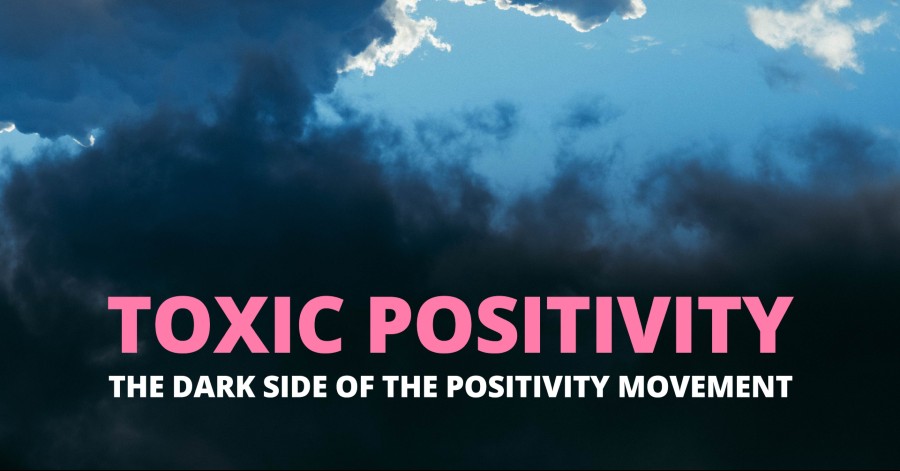The Dangers of Toxic Positivity

I’m sure at some point in your life you’ve been told that being positive is the way forward and ‘looking on the bright side’ is the best approach to take. The question is, is being positive all the time, regardless of what is happening in our lives, the best route to take?
Well, probably not. As beneficial as having a positive outlook can be, it is possible to overdose on positivity, which may lead to the manifestation of negative thoughts and feelings. Yes, I know it may seem odd to see the words ‘toxic’ and ‘positivity’ paired together, but it’s crucial to know what ‘toxic positivity’ is, how to recognise it, and, most importantly, how to avoid it.
Let’s begin by examining what toxic positivity actually is.
What is Toxic Positivity?

Toxic positivity can be defined as the assumption that, regardless of a person’s emotional pain or circumstances, they should only have a positive outlook, i.e. ‘positive vibes’. This, as you can imagine, can result in denial and an all-round inauthentic human emotional experience. Just like anything else consumed in excess, when a blanket approach of positivity is used to mask or stifle human experience, it becomes toxic. By not allowing ourselves to experience certain emotions or by blocking certain feelings, we rapidly descend into a state of denial and repressed emotions. The sad truth its, humans are flawed creatures, often experiencing restatement, greed, anger, and jealously. After all, sometimes life just doesn’t go how we want it to. By putting on a front that all is well, i.e. forcing ‘positive vibes’ on ourselves (and others), we completely deny authentic human experience.
What Are The Signs of Toxic Positivity?
Here are some examples of common traits associated with toxic positivity:
1. Hiding true feelings.
2. Feeling guilty for your emotions and how you feel.
3. Minimising other people feelings and experience with ‘positive vibe’ quotes and sayings.
4. Giving perspective, i.e. “it could be worse”, rather than validating their emotions and experience.
5. Shaming others for expressing anything but positivity.
Why Is Toxic Positivity Bad For Our Health?
#1 – Shame
Forcing positivity on others encourage a person to keep their struggles to themselves. Let’s face it; no-one wants to feel like they’re a drag; therefore, when we have a choice between acting brave and being honest or putting on a front and pretending everything is ok, we’ll often opt for the latter. Shame is something that cripples the human spirit and is certainly one of the most uncomfortable feelings we, as humans, can feel. Toxic positivity leads to increased feelings of shame as we feel ashamed that we’re feeling anything but positive.
#2 – Suppression of Emotions
Research has indicated on many occasions that hiding our feelings increases stress levels and reduces our ability to avoid feelings that cause us distress and negative emotions. Studies exemplify that by expressing a wide spectrum of emotions (even ones that aren’t positive) and having the ability to put into words how we feel can help us to regulate stress and our response to it.
When we hide a part of who we are, we often create a fake persona to the rest of the world. Unfortunately, this persona usually takes the guise of someone who uses such phrases as “Everything happens for a reason” or “It is what it is”. When we deny our true selves, we deny the truth and don’t face up to our feelings and emotions, and they become deeply entrenched in our brain and body, which can, in some cases, cause anxiety and depression.
Acknowledging our emotions will help us to recognise, understand and accept how we are feeling, which will help to keep us sane – not to mention relieving stress and tension. Embracing all emotions, regardless of whether they’re good, bad, or indifferent, is the key to robust mental health.
#3 – Isolation (and more)
Denying our ‘truth’ leads to inauthentic living and interactions with the world around us. We not only lose connection with who we are but also make it much more difficult for others to relate to and connect with us. We might appear infallible from the outside, but inside we’re emotional wrecks who just want attention, help, and, in most cases, a big hug! Your relationship with yourself is often mirrored in the relationship you have with other people. If you’re unable to come to terms with your own feelings, how can you express your feelings about and to someone else? Creating a fake persona and emotions will only attract further falseness, which can result in inauthentic intimacy and superficial relationships.
